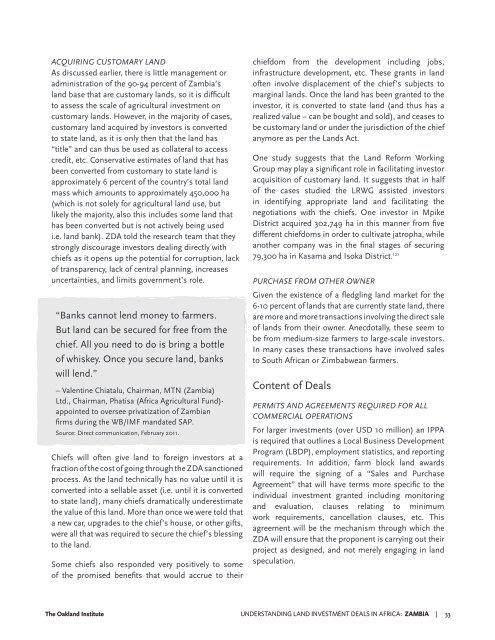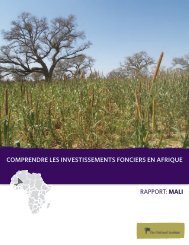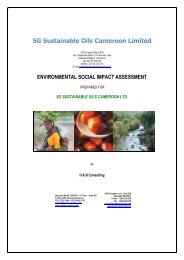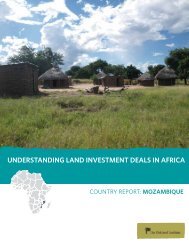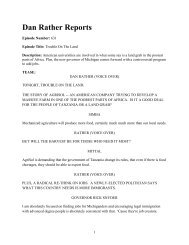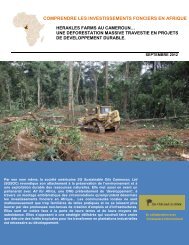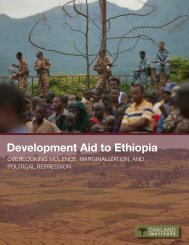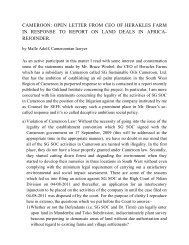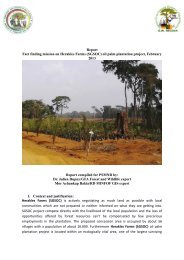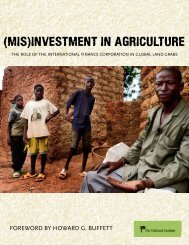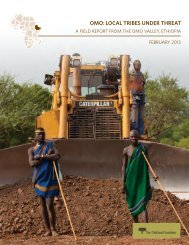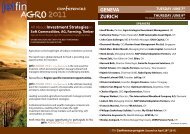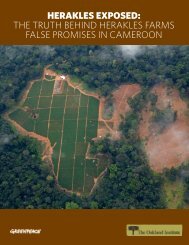Zambia - Oakland Institute
Zambia - Oakland Institute
Zambia - Oakland Institute
You also want an ePaper? Increase the reach of your titles
YUMPU automatically turns print PDFs into web optimized ePapers that Google loves.
ACQUIRING CUSTOMARY LAND<br />
As discussed earlier, there is little management or<br />
administration of the 90-94 percent of <strong>Zambia</strong>’s<br />
land base that are customary lands, so it is difficult<br />
to assess the scale of agricultural investment on<br />
customary lands. However, in the majority of cases,<br />
customary land acquired by investors is converted<br />
to state land, as it is only then that the land has<br />
“title” and can thus be used as collateral to access<br />
credit, etc. Conservative estimates of land that has<br />
been converted from customary to state land is<br />
approximately 6 percent of the country’s total land<br />
mass which amounts to approximately 450,000 ha<br />
(which is not solely for agricultural land use, but<br />
likely the majority, also this includes some land that<br />
has been converted but is not actively being used<br />
i.e. land bank). ZDA told the research team that they<br />
strongly discourage investors dealing directly with<br />
chiefs as it opens up the potential for corruption, lack<br />
of transparency, lack of central planning, increases<br />
uncertainties, and limits government’s role.<br />
“Banks cannot lend money to farmers.<br />
But land can be secured for free from the<br />
chief. All you need to do is bring a bottle<br />
of whiskey. Once you secure land, banks<br />
will lend.”<br />
– Valentine Chiatalu, Chairman, MTN (<strong>Zambia</strong>)<br />
Ltd., Chairman, Phatisa (Africa Agricultural Fund)-<br />
appointed to oversee privatization of <strong>Zambia</strong>n<br />
firms during the WB/IMF mandated SAP.<br />
Source: Direct communication, February 2011.<br />
Chiefs will often give land to foreign investors at a<br />
fraction of the cost of going through the ZDA sanctioned<br />
process. As the land technically has no value until it is<br />
converted into a sellable asset (i.e. until it is converted<br />
to state land), many chiefs dramatically underestimate<br />
the value of this land. More than once we were told that<br />
a new car, upgrades to the chief’s house, or other gifts,<br />
were all that was required to secure the chief’s blessing<br />
to the land.<br />
Some chiefs also responded very positively to some<br />
of the promised benefits that would accrue to their<br />
chiefdom from the development including jobs,<br />
infrastructure development, etc. These grants in land<br />
often involve displacement of the chief’s subjects to<br />
marginal lands. Once the land has been granted to the<br />
investor, it is converted to state land (and thus has a<br />
realized value – can be bought and sold), and ceases to<br />
be customary land or under the jurisdiction of the chief<br />
anymore as per the Lands Act.<br />
One study suggests that the Land Reform Working<br />
Group may play a significant role in facilitating investor<br />
acquisition of customary land. It suggests that in half<br />
of the cases studied the LRWG assisted investors<br />
in identifying appropriate land and facilitating the<br />
negotiations with the chiefs. One investor in Mpike<br />
District acquired 302,749 ha in this manner from five<br />
different chiefdoms in order to cultivate jatropha, while<br />
another company was in the final stages of securing<br />
79,300 ha in Kasama and Isoka District. 121<br />
PURCHASE FROM OTHER OWNER<br />
Given the existence of a fledgling land market for the<br />
6-10 percent of lands that are currently state land, there<br />
are more and more transactions involving the direct sale<br />
of lands from their owner. Anecdotally, these seem to<br />
be from medium-size farmers to large-scale investors.<br />
In many cases these transactions have involved sales<br />
to South African or Zimbabwean farmers.<br />
Content of Deals<br />
PERMITS AND AGREEMENTS REQUIRED FOR ALL<br />
COMMERCIAL OPERATIONS<br />
For larger investments (over USD 10 million) an IPPA<br />
is required that outlines a Local Business Development<br />
Program (LBDP), employment statistics, and reporting<br />
requirements. In addition, farm block land awards<br />
will require the signing of a “Sales and Purchase<br />
Agreement” that will have terms more specific to the<br />
individual investment granted including monitoring<br />
and evaluation, clauses relating to minimum<br />
work requirements, cancellation clauses, etc. This<br />
agreement will be the mechanism through which the<br />
ZDA will ensure that the proponent is carrying out their<br />
project as designed, and not merely engaging in land<br />
speculation.<br />
The <strong>Oakland</strong> <strong>Institute</strong> UNDERSTANDING LAND INVESTMENT DEALS IN AFRICA: ZAMBIA | 33


